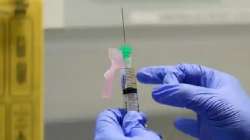Single dose COVID-19 vaccine candidate generates immunity in mice: Study
Scientists have demonstrated that a single-dose COVID-19 vaccine candidate, which could potentially be stored at room temperature, can produce immunity against the novel coronavirus in mice.

Scientists have demonstrated that a single-dose COVID-19 vaccine candidate, which could potentially be stored at room temperature, can produce immunity against the novel coronavirus in mice. The vaccine, described in the ACS Central Science journal, contains ultrasmall nanoparticles studded with the spike proteins of the coronavirus which enables it to enter host cells.
"Our goal is to make a single-shot vaccine that does not require a cold-chain for storage or transport. If we're successful at doing it well, it should be cheap too," said study co-author Peter Kim from Stanford University in the US.
"The target population for our vaccine is low- and middle-income countries," Kim added.
According to the researchers, viral-based vaccines which use viruses to deliver immunising proteins are often more effective than those which contain only isolated protein parts of a virus.
They said nanoparticle vaccines balance the effectiveness of viral-based vaccines with the safety and ease-of-production of protein vaccines.
To develop the vaccine, the scientists first removed a section near the bottom of the spike protein of the coronavirus, and combined it with nanoparticles of ferritin -- an iron-containing protein -- which has been previously tested in humans.
In the following tests in mice, the researchers compared their shortened spike nanoparticles to four other potential variations -- nanoparticles with full spikes, full spikes or partial spikes without nanoparticles, and a vaccine containing just the section of the spike that binds to cells during infection.
The scientists then tested the effectiveness of these vaccines against a safer pseudo-coronavirus that was modified to carry the spike proteins.
They determined the potential effectiveness of each vaccine by monitoring levels of virus neutralising antibodies generated in the mice immune system.
After a single dose, the study found that two nanoparticle vaccine candidates both resulted in neutralising antibody levels at least twice as high as those seen in people who have had COVID-19.
According to the scientists, the shortened spike nanoparticle vaccine produced a significantly higher neutralising response than the binding spike or the full spike vaccines.
After a second dose, they said mice that had received the shortened spike nanoparticle vaccine had the highest levels of neutralising antibodies.
Based on the results, the Stanford scientists said their nanoparticle vaccine could produce COVID-19 immunity after just one dose.
The scientists believe the vaccine could also be stored at room temperature and are assessing whether it could be shipped and stored in a freeze-dried, powder form.
"This is really early stage and there is still lots of work to be done," said Abigail Powell, lead author of the study.
The researchers hope to improve the nanoparticle vaccine candidate to move it closer to initial clinical trials in humans.